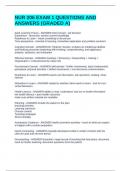NUR 206 EXAM 1 QUESTIONS AND
ANSWERS (GRADED A)
Adult Learning Theory - ANSWER-Self concept - sef-directed
Experience - resources, assess current knowledge
Readiness to Learn - mean something to the person
Time perspective - oriented to learning, immediate application and problem centered
Cognitive Domain - ANSWER-the "thinking" domain, includes six intellectual abilities
and thinking processes beginning with knowing, comprehending, and applying to
analysis, synthesis, and evaluation
Affective Domain - ANSWER-Feelings = Receiving > Responding > Valuing >
Organization > Characterized by Value Set
Psychomotor Domain - ANSWER-skill domain - Reflex movements, basic fundamental,
perceptual, physical activities > skilled movements > non-discursive communication
Readiness to Learn - ANSWER-search out information, ask questions, reading, show
interest
Motivation to Learn - ANSWER-related to whether client wants to learn - look for non-
verbal behaviors
Health Literacy - ANSWER-ability to read, understand, and act on health information
low health literacy = poor health outcomes
make sure written material are readable
Planning - ANSWER-include the patient in the plan
teaching priorities
Learning outcomes
Choose content
Teaching strategies
Show Flexbility
Anticipatory Guidance - ANSWER-health promotion activities - teach to what you expect
to happen with a certain population
Client Contracting - ANSWER-mutually developed verbal or written contract with the
client for goal and set time period
Documenting - ANSWER-Essential > legal record of teaching that took place, document
need for further teaching, document questions from the patient
, Learning outcomes - ANSWER-reflect an observable, measurable activity
add conditions or modifiers to set outcome marker
time by which learning should occur
Choosing Content - ANSWER-Current, accurate, age appropriate, and correct language
Teach Strategies - ANSWER-Demonstration, one-on-one discussion, group learning,
printed and A/V material, internet, DO NOT Overwhelm
Mental Health - ANSWER-cluster of behaviors, thoughts, and feelings, not the
underlying biology - clinically significant disturbances in cognition, emotional regulation,
or behavior that reflects a dysfunction
Wellness - ANSWER-purposeful process of individual growth, integration of experience,
meaningful connection with others, reflecting personally valued goals and strengths,
resulting in being well and living values
Diagnostic MH Tests - ANSWER-Neuro exam
BMP, CMP labs
Therapeutic Med levels
Neuroimaging - info about structural contributions
Pain - ANSWER-physical and sensory experience
Mood, attention and expectation
Suffering - ANSWER-Mental, Emotional, Psychological, or spiritual burden of pain
Nursing Diagnosis - ANSWER-Anxiety
Fear
Stress/Distress
Coping Resources
Safety
Trauma
Suffering to Hope
Nursing process Mental Health - ANSWER-Systematic framework for delivery of nursing
care - goal directed, objective
Address the cluster of behavior
Assist client to adaption of stressors within environment
Goals - change in thoughts, feelings, behaviors that are age-appropriate congruent with
local and cultural norms
Nurse is a member of interdisciplinary team
Biological Domain - ANSWER-overall health - CNS, PNS




